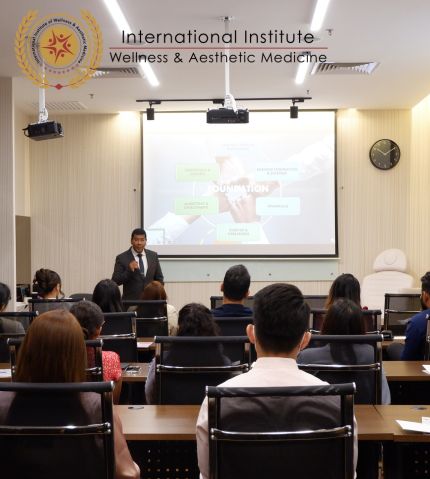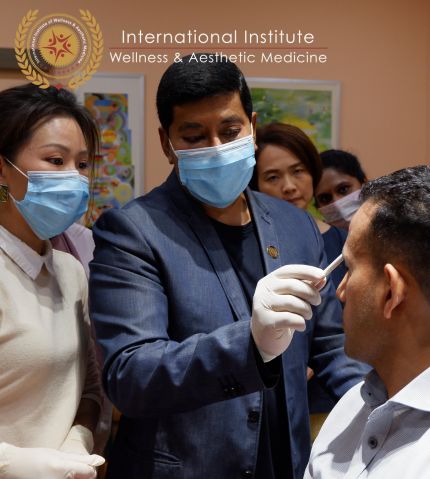What Topics Are Covered in the LCP Certification Exam?
Why Is LCP Certification Important?
Letter of Credentialing and Privileging (LCP) certification is a legal requirement for medical professionals who wish to perform aesthetic treatments in Malaysia. It ensures that practitioners are well-versed in medical ethics, patient safety, and the scientific principles behind aesthetic procedures. By obtaining LCP certification, practitioners not only gain credibility but also enhance their career prospects in the growing aesthetic medicine industry. The LCP certification is recognized by regulatory authorities, ensuring that practitioners are qualified to offer services like Botox, dermal fillers, laser therapy, and more.
At International Institute of Wellness & Aesthetic Medicine (https://www.iiwam.ac), formerly known as Aesthetic Academy Asia (https://www.aestheticacademy.asia), we offer a comprehensive curriculum designed to prepare practitioners for the LCP certification exam. Our aesthetics courses provide expert-led training, hands-on experience, and in-depth knowledge of the topics covered in the exam. Below, we highlight the key areas that candidates must be familiar with to succeed in the LCP certification exam.
Key Topics Covered in the LCP Certification Exam
The LCP certification exam evaluates a wide range of topics relevant to aesthetic medicine, from theoretical knowledge to practical skills. Here are the primary topics that candidates will encounter during the certification process:
1. Basic Medical and Dermatological Knowledge
A strong foundation in general medical principles and dermatology is essential for aesthetic practitioners. The exam will assess knowledge of basic integumentary systems, physiology, and skin structure. Candidates must also be familiar with common dermatological conditions and the ways in which these conditions can affect aesthetic procedures.
Some key areas include:
- Integumentary system and physiology of the skin: Understanding the layers of the skin, including the epidermis, dermis, and hypodermis.
- Common skin disorders: Conditions such as acne, rosacea, and hyperpigmentation that may impact aesthetic treatment choices.
- Wound healing and skin regeneration: The body’s natural process of healing and how it influences aesthetic procedures like micro-needling and chemical peels.
2. Aesthetic Procedures and Techniques
The heart of the LCP certification exam lies in understanding various aesthetic treatments. Candidates must demonstrate knowledge of the procedures they will be legally allowed to perform, ensuring patient safety and effective outcomes. This includes both non-invasive and minimally invasive techniques that are common in the industry today.
The topics include:
- Injectables: Botox and dermal fillers are among the most popular aesthetic treatments, and candidates must be proficient in integumentary system, injection techniques, and safety measures.
- Laser and light-based therapies: Knowledge of different laser technologies, such as Q-Switch lasers, Pico lasers, and CO2 lasers, used for skin resurfacing, hair removal, and treating pigmentation.
- Microneedling and Platelet-Rich Plasma (PRP): Understanding the science behind microneedling, PRP therapy, and their benefits in promoting collagen production and skin rejuvenation.
3. Patient Consultation and Safety
A significant portion of the LCP certification exam focuses on patient consultation skills. Candidates must understand how to assess a patient’s suitability for aesthetic treatments, manage expectations, and identify contraindications. This section also emphasizes the importance of patient safety, ethical practice, and legal responsibilities.
Topics covered in this section include:
- Consultation techniques: How to conduct thorough patient consultations, including medical history assessments and determining treatment goals.
- Contraindications and risk factors: Identifying factors that may disqualify a patient from certain aesthetic procedures, such as pregnancy or active skin infections.
- Informed consent: Ensuring that patients are fully informed about the risks, benefits, and potential side effects of treatments.
- Managing complications: Understanding common complications, such as bruising or swelling, and knowing how to address them.
4. Medical Ethics and Legal Considerations
Medical ethics and legal standards are paramount in the field of aesthetics. The LCP certification exam evaluates candidates’ knowledge of professional ethics, patient confidentiality, and legal issues related to aesthetic treatments. Practitioners must be aware of their ethical obligations and the legal framework governing aesthetic practices in Malaysia.
Key areas include:
- Ethical standards in aesthetics: Treating patients with respect, maintaining patient confidentiality, and ensuring non-discriminatory practices.
- Legal requirements: Familiarity with the regulatory framework governing aesthetic practices in Malaysia, including guidelines from the Ministry of Health (MOH).
- Record keeping and documentation: Understanding the importance of accurate patient records and legal documentation for aesthetic treatments.
5. Post-Treatment Care and Management
Post-treatment care is critical for ensuring the best results and minimizing complications after aesthetic procedures. The LCP certification exam evaluates candidates’ knowledge of aftercare protocols, including how to guide patients through the recovery process and when to seek further medical attention.
Topics in this area include:
- Aftercare instructions: Proper care instructions for various treatments, such as avoiding sun exposure after laser therapy or using specific skincare products after chemical peels.
- Handling adverse reactions: How to recognize and address potential side effects or complications, such as infection or allergic reactions, following a procedure.
- Long-term results and maintenance: Providing patients with advice on maintaining the results of their treatments and managing any ongoing care.
6. Aesthetic Medicine Technology and Trends
The field of aesthetic medicine is constantly evolving, with new technologies and trends emerging regularly. The LCP certification exam includes an assessment of current and emerging trends in aesthetic medicine, ensuring that practitioners are up-to-date with the latest techniques and equipment.
Key topics include:
- Advancements in aesthetics: Staying current with the latest non-invasive treatments, such as body contouring technologies, and understanding how they work.
- New product developments: Understanding the latest injectables, fillers, and skincare products used in aesthetic treatments.
- Technology integration: Familiarity with the latest aesthetic devices and technologies, including their safety and effectiveness.
Conclusion
The LCP certification is a crucial step for medical professionals looking to practice aesthetic medicine legally and safely in Malaysia. It ensures that practitioners are fully equipped with the knowledge, skills, and ethical understanding necessary to provide high-quality treatments. By completing the LCP certification, doctors not only adhere to regulatory standards but also build trust with patients and establish credibility in the competitive field of aesthetics.
At Aesthetic Academy Asia (https://www.aestheticacademy.asia) and International Institute of Wellness & Aesthetic Medicine (https://www.iiwam.ac), we offer expert-led training programs that guide you through every step of the LCP certification process. Our comprehensive courses provide the knowledge, practical experience, and documentation support needed to help you succeed. Start your journey today with Aesthetic Academy Asia and take the first step towards a rewarding career as a certified aesthetic practitioner.
About International Institute of Wellness & Aesthetic Medicine (IIWAM)
International Institute of Wellness & Aesthetic Medicine (https://www.iiwam.ac) previously known as Aesthetic Academy Asia (https://www.aestheticacademy.asia) is a private teaching institution that provides International Aesthetic Medical Certification program for Doctors, Dentists, Nurses, Aestheticians, and Spa Owners. Prof Dr Morthy, the course director for the Institute, is a key opinion leader for Aesthetic Medicine in the region, and a trainer for several teaching institutions. Prof Dr Morthy developed several aesthetic medical training programs notably the UCSI Masters Aesthetic Medical Course, MAHSA Academy of Aesthetic Medicine and the MAC Aesthetic course.
IIWAM is the only Institute to have its Aesthetic Education Programs certified by City & Guilds of London, CPD Standards Office (UK) and European International University (Paris). IIWAM is also a registered CPD Training provider for Malaysian Medical Association.
With our insignia of “Be Certified & Be Recognized”, the Institute develops knowledgeable, skilled, and confident aesthetic practitioners of international repute.



